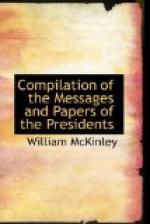Private property, whether belonging to individuals or corporations, is to be respected, and can be confiscated only for cause. Means of transportation, such as telegraph lines and cables, railways, and boats, may, although they belong to private individuals or corporations, be seized by the military occupant, but unless destroyed under military necessity are not to be retained.
While it is held to be the right of the conqueror to levy contributions upon the enemy in their seaports, towns, or provinces which may be in his military possession by conquest, and to apply the proceeds to defray the expenses of the war, this right is to be exercised within such limitations that it may not savor of confiscation. As the result of military occupation the taxes and duties payable by the inhabitants to the former government become payable to the military occupant, unless he sees fit to substitute for them other rates or modes of contribution to the expenses of the government. The moneys so collected are to be used for the purpose of paying the expenses of government under the military occupation, such as the salaries of the judges and the police, and for the payment of the expenses of the army.
Private property taken for the use of the army is to be paid for when possible in cash at a fair valuation, and when payment in cash is not possible receipts are to be given.
All ports and places in Cuba which may be in the actual possession of our land and naval forces will be opened to the commerce of all neutral nations, as well as our own, in articles not contraband of war, upon payment of the prescribed rates of duty which may be in force at the time of the importation.
WILLIAM McKINLEY.
WASHINGTON, D.C., July 16, 1898.
General SHAFTER,
Commanding United States Forces, Santiago,
Playa:
The President of the United States sends to you and your brave army the profound thanks of the American people for the brilliant achievements at Santiago, resulting in the surrender of the city and all of the Spanish troops and territory under General Toral. Your splendid command has endured not only the hardships and sacrifices incident to campaign and battle, but in stress of heat and weather has triumphed over obstacles which would have overcome men less brave and determined. One and all have displayed the most conspicuous gallantry and earned the gratitude of the nation. The hearts of the people turn with tender sympathy to the sick and wounded. May the Father of Mercies protect and comfort them.
WILLIAM McKINLEY.
EXECUTIVE MANSION, Washington, July 21, 1898.
In view of the occupation of Santiago de Cuba by the forces of the United States, it is ordered that postal communication between the United States and that port, which has been suspended since the opening of hostilities with Spain, may be resumed, subject to such military regulations as may be deemed necessary.




